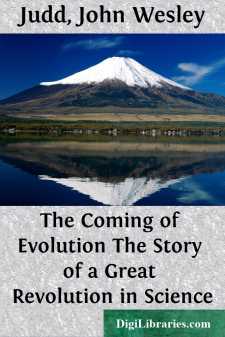Categories
- Antiques & Collectibles 13
- Architecture 36
- Art 48
- Bibles 22
- Biography & Autobiography 813
- Body, Mind & Spirit 142
- Business & Economics 28
- Children's Books 17
- Children's Fiction 14
- Computers 4
- Cooking 94
- Crafts & Hobbies 4
- Drama 346
- Education 46
- Family & Relationships 57
- Fiction 11829
- Games 19
- Gardening 17
- Health & Fitness 34
- History 1377
- House & Home 1
- Humor 147
- Juvenile Fiction 1873
- Juvenile Nonfiction 202
- Language Arts & Disciplines 88
- Law 16
- Literary Collections 686
- Literary Criticism 179
- Mathematics 13
- Medical 41
- Music 40
- Nature 179
- Non-Classifiable 1768
- Performing Arts 7
- Periodicals 1453
- Philosophy 64
- Photography 2
- Poetry 896
- Political Science 203
- Psychology 42
- Reference 154
- Religion 513
- Science 126
- Self-Help 84
- Social Science 81
- Sports & Recreation 34
- Study Aids 3
- Technology & Engineering 59
- Transportation 23
- Travel 463
- True Crime 29
The Coming of Evolution The Story of a Great Revolution in Science
by: John Wesley Judd
Description:
Excerpt
CHAPTER I
INTRODUCTORY
When the history of the Nineteenth Century—'the Wonderful Century,' as it has, not inaptly, been called—comes to be written, a foremost place must be assigned to that great movement by which evolution has become the dominant factor in scientific progress, while its influence has been felt in every sphere of human speculation and effort. At the beginning of the Century, the few who ventured to entertain evolutionary ideas were regarded by their scientific contemporaries, as wild visionaries or harmless 'cranks'—by the world at large, as ignorant 'quacks' or 'designing atheists.' At the end of the Century, evolution had not only become the guiding principle of naturalists, but had profoundly influenced every branch of physical science; at the same time, suggesting new trains of thought and permeating the language of philologists, historians, sociologists, politicians—and even of theologians.
How has this revolution in thought—the greatest which has occurred in modern times—been brought about? What manner of men were they who were the leaders in this great movement? What the influences that led them to discard the old views and adopt new ones? And, under what circumstances were they able to produce the works which so profoundly affected the opinions of the day? These are the questions with which I propose to deal in the following pages.
It has been my own rare good fortune to have enjoyed the friendship of all the great leaders in this important movement—of Huxley, Hooker, Scrope, Wallace, Lyell and Darwin—and, with some of them, I was long on terms of affectionate intimacy. From their own lips I have learned of incidents, and listened to anecdotes, bearing on the events of a memorable past. Would that I could hope to bring before my readers, in all their nobility, a vivid picture of the characteristics of the men to whom science and the world owe so much!
For it is not only by their intellectual greatness that we are impressed. Every man of science is proud, and justly proud, of the grandeur of character, the unexampled generosity, the modesty and simplicity which distinguished these pioneers in a great cause. It is unfortunately true, that the votaries of science—like the cultivators of art and literature—have sometimes so far forgotten their high vocation, as to have been more careful about the priority of their personal claims than of the purity of their own motives—they have sometimes, it must be sadly admitted, allowed self-interest to obscure the interests of science. But in the story we have to relate there are no 'regrettable incidents' to be deplored; never has there occurred any event that marred the harmony in this band of fellow-workers, striving towards a great ideal. So noble, indeed, was the great central figure—Charles Darwin—that his senior Lyell and all his juniors were bound to him by the strongest ties of admiration, respect and affection; while he, in his graceful modesty, thought more of them than of himself, of the results of their labours rather than of his own great achievement.
It is not, as sometimes suggested, the striking out of new ideas which is of the greatest importance in the history of science, but rather the accumulation of observations and experiments, the reasonings based upon these, and the writings in which facts and reasonings are presented to the world—by which a merely suggestive hypothesis becomes a vivifying theory—that really count in making history.
Talking with Matthew Arnold in 1871, he laughingly remarked to me 'I cannot understand why you scientific people make such a fuss about Darwin. Why it's all in Lucretius!' On my replying, 'Yes! Lucretius guessed what Darwin proved,' he mischievously rejoined 'Ah! that only shows how much greater Lucretius really was,—for he divined a truth, which Darwin spent a life of labour in groping for.'
Mr Alfred Russel Wallace has so well and clearly set forth the essential difference between the points of view of the cultivators of literature and science in this matter, that I cannot do better than to quote his words....


